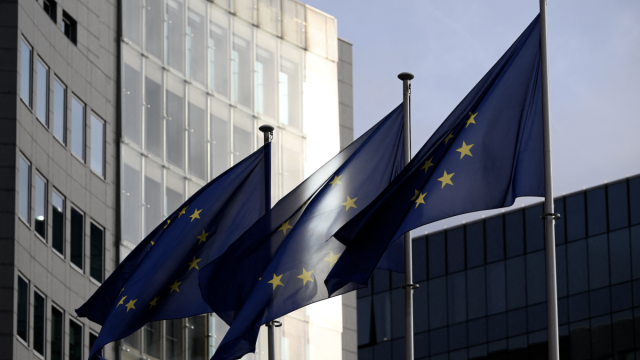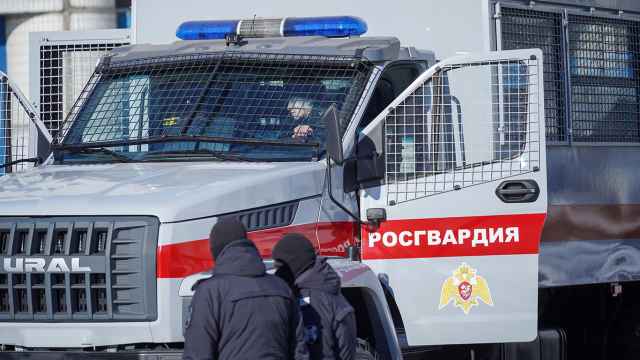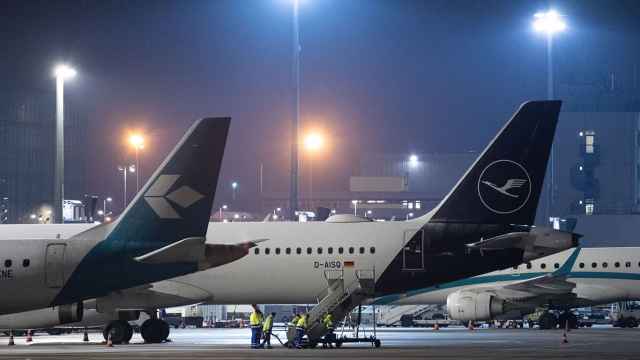Russia's severe drought and stumbling oil prices look set to cap the ruble's appreciation this year as they put pressure on the country's revenues and current account surplus.
When the drought began in late June, banks including Goldman Sachs, Raiffeisen and BNP Paribas saw it as positive for the ruble, expecting that the Central Bank would battle an expected rise in food inflation by allowing greater currency appreciation.
But as a prolonged drought has devastated many Russian grain-growing regions, slashing its grain crop by nearly a third, Russia is having to import more than previously thought, putting pressure on the country's current account surplus.
Along with a faltering global economic recovery, which is depressing oil prices and risk appetite, the increased importing is prompting analysts to trim their ruble forecasts, arguing that supporting the economy will take precedence over combating inflation risk.
Russia's economy grew 2.5 percent year on year in July — half as fast as in June — and concern about the outlook and reduced demand for riskier, emerging market assets have pushed the ruble to a seven-week low this week, at 30.95 to the dollar.
The Economic Development Ministry, in economic forecasts for 2011-13 released on Thursday, has downgraded its exchange rate forecasts for the next three years.
It no longer expects the currency — which has rallied 20 percent against its basket since the start of 2009 — to gradually appreciate, forecasting that the currency will average 30.5 to the dollar next year and close to that in 2012 and 31 to the dollar in 2013.
Gazprombank has revised its forecast for the ruble for the end of this year to 34.27 against the basket, from a forecast in July of 33.57, and only 0.5 percent higher than current levels.
"The downside pressure on the ruble will likely have two sources. The first is a presumed weakness of oil prices; the other is a reduction of the current account surplus from rising imports," said Anna Bogdyukevich, an analyst at Gazprombank.
ING has cut its year-end forecast to 33.05 rubles per basket from 31.93 a month ago.
Deputy Economic Development Minister Andrei Klepach said last week that the drought would cut economic growth this year by up to 0.8 percentage points and push inflation up above the 6 percent to 7 percent target.
The ruble, he said, should be largely unaffected as Russia will retain its trade surplus and reserves. Financial markets, however, are not convinced.
"If inflation accelerates, it points at pressure on the ruble through higher imports and pressure on the trade balance," said Natalya Orlova, chief economist at Alfa Bank.
Rising imports, she said, could slash the fourth-quarter current account surplus to below $10 billion from $33.3 billion in the first quarter of 2010.
"Only a few are betting on a stronger ruble now as there is no confidence in fundamental reasons," Orlova said, forecasting that the ruble would end 2010 at 34.20 versus its basket.
Signs that global economic recovery is slowing have sent oil prices down $10 from a peak of nearly $83 on Aug. 4, threatening to hurt revenues in Russia, the world's biggest oil producer.
Russia's imports from countries outside the former Soviet Union surged 35.6 percent in July from a year earlier, and analysts expect the trend to continue.
Andrei Sizov Sr., CEO of SovEcon agricultural analysts, said Thursday that Russia, usually the world's No. 3 wheat exporter, may need to import up to 6 million tons of grain in 2010-11 because of the drought.
Investor sentiment already seems to be cooling on Russia, which had been favored as it offers yields above 6 percent on some assets. Data from Emerging Portfolio Fund Research shows that Russia saw its biggest weekly fund outflow since May in the week to Aug. 20, extending outflows in previous weeks.
"Foreign investors' attitude toward Russia is becoming worse given a deterioration in the economic outlook. Undoubtedly, the drought factor took its toll," said a dealer at a major Russian bank in Moscow.
The government forecasts 4 percent economic growth this year, reversing a 7.9 percent slump last year, but Klepach warned that growth could be only 3.6 percent to 3.8 percent because of the drought.
The ruble has weakened to seven-week lows of 34.65 against its basket — moving out of the Central Bank's intervention range of 34.40 to 33.40 per basket.
That means the Central Bank is not standing in the way of the ruble. If it wanted to battle inflation with a stronger currency, it would have to stage artificial appreciation by actually buying rubles — something the regulator is unlikely to do at a time when economic growth is slowing.
Any such steps would also contradict its intervention policy and its aim of gradually moving toward a free-float regime.
Raising interest rates from current record lows is also seen as unlikely.
"The ruble doesn't appreciate by itself, and to make it stronger, the Central Bank would have to sell its reserves or hike interest rates, which is absolutely inappropriate for the post-crisis economy," said Vladimir Osakovsky, an economist at UniCredit bank in Moscow.
A Message from The Moscow Times:
Dear readers,
We are facing unprecedented challenges. Russia's Prosecutor General's Office has designated The Moscow Times as an "undesirable" organization, criminalizing our work and putting our staff at risk of prosecution. This follows our earlier unjust labeling as a "foreign agent."
These actions are direct attempts to silence independent journalism in Russia. The authorities claim our work "discredits the decisions of the Russian leadership." We see things differently: we strive to provide accurate, unbiased reporting on Russia.
We, the journalists of The Moscow Times, refuse to be silenced. But to continue our work, we need your help.
Your support, no matter how small, makes a world of difference. If you can, please support us monthly starting from just $2. It's quick to set up, and every contribution makes a significant impact.
By supporting The Moscow Times, you're defending open, independent journalism in the face of repression. Thank you for standing with us.
Remind me later.





